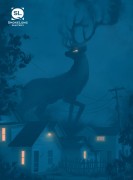Theresa, what was the impetus for this story?
I wrote the first draft of “Haunt” when I was feeling fragmented and almost debilitatingly nostalgic about certain memories. But these were memories I’d embellished and mulled over to such an extent I couldn’t tell if they were real or not. In fact, I knew that most weren’t. Still, I felt troubled by the feeling that I’d left something important in the past.
I wanted to fictionalize and explore this phenomenon on the page, to write about a mind looping on itself. I also itched to write a story sort of unhinged in time. The younger sister’s disappearance locked everything into place by helping me put these abstract feelings of loss into a more concrete form. Once I had that element, I could write this story.
I found myself thinking a lot about the boogeyman after I read your story—more critically than usual. What makes the boogeyman, in any form, so pervasive in human consciousness? What does he stand for that we can’t just write off and move on from?
Perhaps the boogeyman is pervasive because he is simultaneously so vague and so personal. He doesn’t seem to have an established form or method; instead he’s a catch-all symbol of the unknown, a hazy embodiment of terror to which you can attach your fears. At the same time, adults tell children the boogeyman will get them for very specific faults. He’s a personal monster tailored to your weaknesses. He cares whether you sort your socks, feed your cat, go down the off-limits road ….
In the story, I feel the protagonist is afraid of but also invigorated by the thought of a boogeyman, an entity that exists in hostile counterpoint to the established home.
You have some wonderful sentences. One that sticks out is toward the beginning: “They were barefoot walking home, dark dots darting in their cupped hands.” My question is, during your writing process, how do you know a sentence is finished? The way it sounds? The grammar? Your gut?
Thank you! It really varies and is a combination of the things you list. My sentences can be vague at first, so as I’m polishing I try to be alert to bland verbs and nouns. I try to get more specific with sensory details and to use each sentence as an opportunity to build a particular atmosphere. Towards the end I have to pretend I’m someone else, someone with very high standards, reading dispassionately and totally unimpressed. I adjust sentences until that person uncrosses their arms and nods—fine.
But ultimately it has a lot to do with sound, especially the number of syllables that feels right for various moments.
I was fascinated by the lack of dialogue in the story as I read along. Everything seems so quiet and contemplative, I felt like her sister’s disappearance was unspeakable to her—unknowable, too. Then, as she buries her tooth, in a moment when neither the protagonist nor the audience knows if it’s a dream, her sister speaks. It’s a stirring moment. You make two lines of dialogue seem so loud. What can quiet give to a story that action can’t?
For me, that unspeakability and unknowability is absolutely central to the story, but then there’s the challenge of not alienating a reader. I hoped to lull readers in with an engaging set of images that operated according to an emotional logic, for the quietness and haziness to make sense because the piece is so interior. I think dialogue, especially everyday dialogue, would puncture this interiority since a spoken line is so concrete and tied to a specific time. It could jolt readers out of the dream and put the focus on the exterior circumstance.
So instead it’s a matter of puncturing, or jolting, at the right moment. One spoken exchange between the sisters seemed right to me. I hoped it would give the moment weight.
There were moments in this story that felt cinematic. So, in that spirit, if you were to cast these characters in a short film, who would you pick to play each role?
Oh wow, the possibilities ….
If it could be anyone, the young sisters would be played by Ana Torrent and Isabel Telleria from Victor Erice’s The Spirit of the Beehive. In that movie they are experts at looking moody and pensive while staring at landscapes! For the others, I don’t know.



 The core workshop of SmokeLong Fitness is all in writing, so you can take part from anywhere at anytime. We are excited about creating a supportive, consistent and structured environment for flash writers to work on their craft in a community. We are thrilled and proud to say that our workshop participants have won, placed, or been listed in every major flash competition. Community works.
The core workshop of SmokeLong Fitness is all in writing, so you can take part from anywhere at anytime. We are excited about creating a supportive, consistent and structured environment for flash writers to work on their craft in a community. We are thrilled and proud to say that our workshop participants have won, placed, or been listed in every major flash competition. Community works.